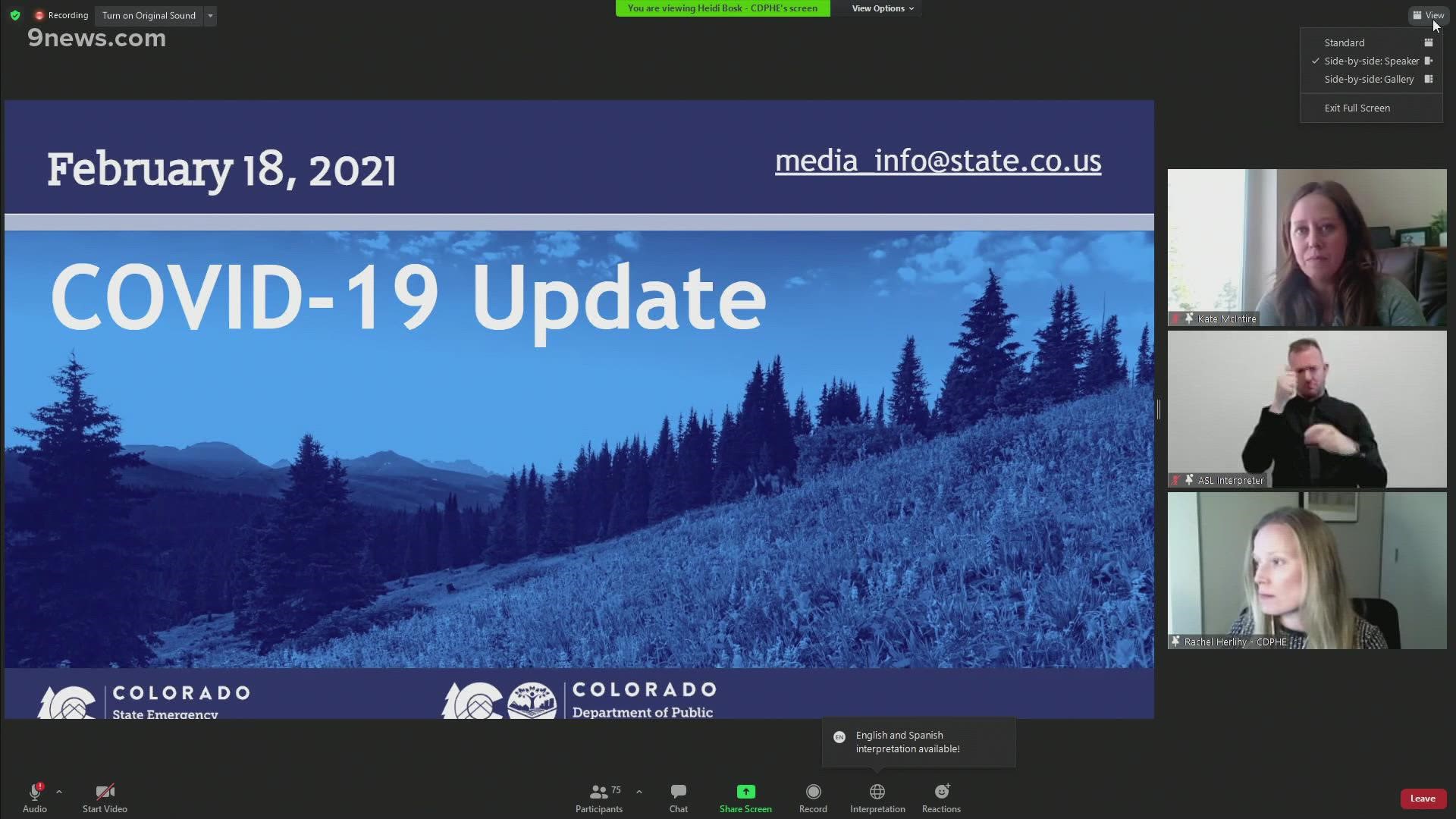COLORADO, USA — Colorado health leaders and members of the vaccine task force provided an update on COVID-19 Thursday.
The briefing began just after 3 p.m. and included:
Dr. Rachel Herlihy, state epidemiologist with the Colorado Department of Public Health and Environment
Kevin Klein, Director, Colorado Division of Homeland Security and Emergency Management
Kate McIntire, deputy director, State Vaccine Task Force
Scott Sherman, Brigadier General
>Video above: The full CDPHE briefing from Feb. 18.
Vaccine latest
McIntire said more than 130,000 doses were delayed coming to Colorado this week due to the deep, far-reaching cold snap that hit parts of the U.S. McIntire said the storm affected dry ice production in Kentucky, transportation from Tennessee, and delayed employees from going to work in Michigan, where the vaccine is being made.
Sherman said the delayed doses were expected to arrive to the state between Thursday and Saturday. Sherman said 79,000 Pfizer doses were expected Thursday, as well as more than 15,000 doses on Friday and at least 5,000 doses on Saturday. Sherman said they were expecting to receive more than 46,000 Moderna doses Friday and more than 51,000 doses no later than Monday.
Sherman said Colorado will begin receiving 218,000 doses per week the first week of March. Sherman said the state has the capacity to administer 300,000-400,000 doses per week.
Have a vaccine-related question or story idea? Use the form below to tell us all about it.
More mass vaccination sites are being planned for around the state, Sherman said. He did not have specifics on when and where those might happen.
McIntire added that the state is close to achieving its goal of vaccinating 70% of people 70 and older in Colorado. As of Feb.18, 337,124 people over the age of 70 have received at least their first dose, according to McIntire. McIntire said there are more than 550,000 people over the age of 70 in Colorado.
The briefing came as numbers continued their decline in the state with hospitalizations statewide below 430 as of Feb. 18. Additionally, 748,151 people have been vaccinated with one dose of the vaccine as of Feb. 18, and 333,859 have been vaccinated with two doses. Both vaccines currently authorized are about 95% effective and require two doses to achieve immunization.
COVID variants
Dr. Rachel Herlihy gave an update on the state's COVID-19 variants. She said currently there are 71 confirmed cases of the B.1.1.7 strain. Herlihy added there are 29 confirmed cases of the L452R variant.
The B.1.1.7 variant is listed on CDPHE slides as being a "variant of concern" due to it being more contagious, CDPHE said.
RELATED: Number of new COVID-19 outbreaks in Colorado declines, new cases reported at schools, restaurants
CDPHE released an analysis Tuesday that shows an increase in long-term exposure to fine particle air pollution is generally associated with COVID-19 infections, hospitalizations and deaths at the neighborhood level in Colorado.
Initially, the team set out to look primarily at the relationship between fine particle air pollution and COVID-19 outcomes, accounting for possible confounding factors, but researchers found they needed more local pollution data to fully understand the relationship. However, significant associations between communities of color and COVID-19 outcomes stood out clearly.
“Centuries of structural discrimination in the U.S. housing system mean people of color and low-income populations often live near busy highways and industrial areas where pollution is worse," said Jill Hunsaker Ryan, CDPHE executive director. "The resulting disproportionate harm to these communities is documented in many studies.
“We’ll accelerate our efforts to implement additional monitoring in areas that have higher levels of air pollution and will continue to do everything we can to ensure an equitable pandemic response.”
SUGGESTED VIDEOS: COVID-19 Coronavirus

